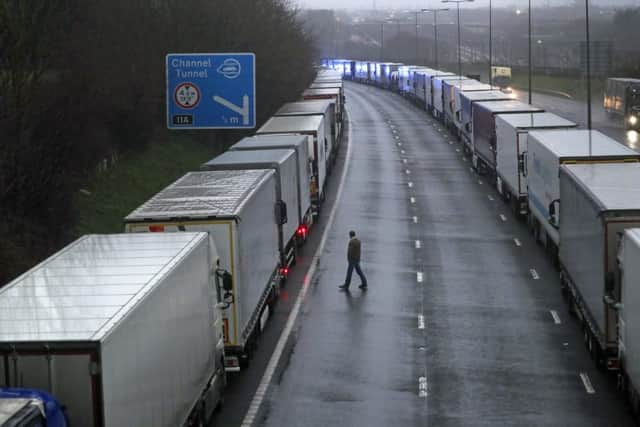These are the foods the UK imports from Europe - and whether shortages are likely


France has imposed a travel ban on UK passengers for 48 hours, due to concerns about the new strain of Covid.
This has resulted in the port of Dover closing to outbound traffic - with warnings about “serious disruption” in place - which has caused fears that imported food products will be affected.
Advertisement
Hide AdAdvertisement
Hide AdBoris Johnson is holding an emergency Cobra meeting on Monday 21 December in an attempt to resolve the situation.
Could there be food shortages because of the port of Dover closure - and what foods do we import from Europe? Here is everything you need to know.
Why is the port of Dover closed?
The Prime Minister has imposed a strict Tier 4 lockdown in London and areas of south-east England, amid a surge in Covid cases thought to be caused by a new strain of the virus.
Shortly after, European countries including Germany, Italy and the Netherlands, announced travel bans from the UK, due to fears of the new variant spreading across borders.
Advertisement
Hide AdAdvertisement
Hide AdFrance also shut its border and suspended all traffic from the UK for two days.
This has caused the port of Dover to close, with many freight lorries forced to queue at Kent as they are unable to cross by sea or through the Eurotunnel.
It has raised fears that trade flows could be severely disrupted, while passengers across Europe could be left stranded in the run-up to Christmas.
The UK Government has urged hauliers not to travel to the port until further notice.
Advertisement
Hide AdAdvertisement
Hide AdRoughly 10,000 lorries a day usually travel between Dover and Calais during the festive period.
Will it reopen?
Boris Johnson is chairing an emergency Cobra meeting on Monday 21 December, consisting of senior ministers and officials, to discuss the halting of the travel between the UK and France.
On Sunday 20 December, a Number 10 spokesperson said: “The Prime Minister will chair a Cobra meeting tomorrow to discuss the situation regarding international travel, in particular the steady flow of freight into and out of the UK.
“Further meetings are happening this evening and tomorrow morning to ensure robust plans are in place.”
Advertisement
Hide AdAdvertisement
Hide AdFrance said on Monday 21 December that it is working on a plan to “ensure movement from the UK can resume”.
Transport minister Jean-Baptiste Djebbari said the cross-EU talks will take place to "establish a solid health protocol" that could begin to reopen the port.
The Channel ports have already been impacted by delays due to Covid-19 and the looming end of the Brexit transition period.
Will there be food shortages?
There are fears that food supplies could be affected by the port closure if it lasts longer than 48 hours, as French hauliers will not want to travel to the UK if they could be stranded.
Advertisement
Hide AdAdvertisement
Hide AdAccording to reports from Sky News, the government is tracking how many days of food are left in supermarkets.
But Transport Secretary Grant Shapps played down the situation and said there is no reason for people to buy any more food than normal leading up to Christmas.
He said: “The shops are well stocked. So in the short term, for the next 48 hours or so, this is not an issue in terms of supply but we're very, very keen to get it resolved.”
Richard Burnett, head of the Road Haulage Association, also said that there will be “plenty of stock” for Christmas food, but the ban could affect the fresh food supply.
Advertisement
Hide AdAdvertisement
Hide AdHe told the BBC: "The retailers have done a good job of stocking up on ambient products [for Christmas] - there will be plenty of stock.
"But the fresh food supply, where it's short shelf life and there will be product on its way now, that's where the challenge comes from.
"The retailers will absolutely be assessing their inbound flows this morning and understanding whether or not those flows are on their way into the retail distribution centres around the country and I'm sure there will be further reassurance given today that those things are in control."
Sainsbury’s has warned the supermarket could face “gaps” its supply of fresh foods within days, if the situation continues.
Advertisement
Hide AdAdvertisement
Hide AdA spokesman for the retailer told the BBC that it had “plenty” of Christmas products, but there could be “gaps over the coming days on lettuce, some salad leaves, cauliflowers, broccoli and citrus fruit” which are all imported from Europe.
What foods do we import from Europe?
The UK imports many common food products from European countries:
Fruit and vegetables
Around 90 percent of the UK’s salad leaves in autumn and winter are produced in south-east Spain.
Britain also imports more than £400million of fresh tomatoes each year, mostly from the Netherlands.
Advertisement
Hide AdAdvertisement
Hide AdPeppers and cucumbers also arrive in Dover from continental Europe.
And some exotic citrus fruits, such as lemons, can be bought in UK supermarkets thanks to growers in Europe.
Frozen potatoes, such as chips, are 99 percent imported from the EU, from the Netherlands and Belgium.
Dairy products
A host of popular cheeses, including mozzarella, brie, feta and halloumi come from countries in Europe.
Advertisement
Hide AdAdvertisement
Hide AdIn 2016, 96,449 tonnes of cheddar was imported into the UK, with 91,866 of that originating in Europe.
Meat
Denmark is the top exporter of bacon and ham to the UK, and the Netherlands, Germany and Italy also import a lot of pork products.
Meat is also largely exported from the UK, especially British lamb with 98 percent being imported to EU countries overseas.
Wine
Wine constitutes the UK’s most valuable food import, totalling more than £2billion a year.